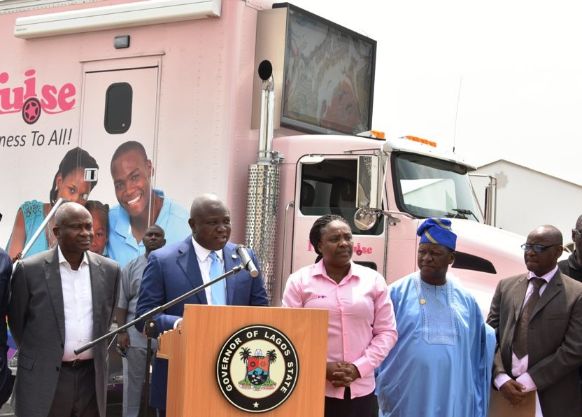
The BIG WAR Against Cancer is operated by mass medical mission, a registered charity which initiated the National Cancer Prevention Programme (NCPP). In 2007, NCPP spearheaded community-based mass cancer screening in Nigeria. Since then, NCPP has millions with awareness and preventive cancer care. This campaign has contributed to a reduction of cancer deaths in Nigeria from 75,392 deaths in 2008 to 70,327 deaths 2018 (WHO data). This reduction, is in spite of the global increase in the incidence of cancer during the same period. The improvement in cancer survivorship in Nigeria is proof positive that we could win the BIG WAR if we could scale up the current effort.
Currently, a fleet of Mobile Cancer Centres (a.k.a. the PinkCruise) have been deployed. The PinkCruise is the first of its kind, equipped with state-of-the-art facilities for screening and treatment (including mammography, endoscopy, colonoscopy, colposcopy, cryotherapy, lab, vaccination and surgeries). To increase the impact of the PinkCruise and to tackle eye and oral cancers, other mobile health units have also been deployed. These include the PinkVISSION (mobile eye unit; where “VISSION” stands for Voluntary Integrated Sight Saving Initiative of Nigeria) and the PinkDentist (mobile dental unit). These mobile units provide free community-based preventive health care, targeted mainly at the under-privileged masses. Further details on the PinkCruise is available at pinkcruise.org.

THE GOVERNOR OF LAGOS STATE HANDS OVER A MOBILE CANCER CENTRE (The PinkCruise) TO THE EXECUTIVE SECRETARY ON WEDNESDAY, THE 14TH OF FEBRUARY, 2018

In addition, properties have also been secured to serve both as base centres for the PinkCruise and as nucleuses for the proposed CCCs. These properties are located in Nigeria’s four old Regions (North, East, West and Mid-West).
INSPIRATION FOR THE BIG WAR AGAINST CANCER
The BIG WAR Against Cancer was initiated by two senior medical experts with broad postgraduate experience and training, spanning four continents of the world. With missionary zeal they have dedicated their lives and resources to the cause for over a decade.
They took up this onerous vocation in response to personal tragedies, occasioned by the loss of close relatives to cancer. These tragic personal losses brought home to them the reality of the crisis in the nation’s health sector.
One of the doctors lost a beloved grandmother to stomach cancer. This woman was the matriarch of her family, having been widowed at a very young age. Sadly, cancer prevented her from living to enjoy the fruit of her labour.
The other doctor lost eight (8) of his family members in quick succession to cancer. A particularly touching case was that of his first cousin, with whom he had stayed while he was a medical student. After the birth of two daughters, this lady experienced secondary infertility before she eventually had a baby boy. Sadly, shortly after the birth of this precious baby boy, she developed a breast lump which was not detected early, because of the masking effect of breast feeding. Within a few months, she died from breast cancer, leaving behind two young daughters, a baby boy and an inconsolable husband. Her husband, an otherwise very healthy senior Air Force Officer, could not stand the shock of losing his wife. Within six months of her death, he also died, leaving behind three young orphans and a devastated extended family.
The last straw for this doctor was the death of his father from prostate cancer. Incidentally, it was his father that donated the house where the first National Cancer Prevention Programme (NCPP) centre was established in Lagos.
“Excellence is the result of caring more than others think is wise, risking more than others think is safe, dreaming more than others think is practical , and expecting more than others think is possible.” – Mac Anderson
THE GOAL OF THE BIG WAR AGAINST CANCER
The aim of ‘the BIG War’ is to make cancer care accessible to all, by establishing three levels of infrastructure, viz:
- Nigeria: At least one Mobile Cancer Centre (MCC) in each State (Cost: $650,000 per MCC)
- Nigeria: At least one Comprehensive Cancer Centre (CCC) in each of the six zones (Cost: $63 million per CCC)
- Global: At least one radio-chemotherapy facility for every million people (a United Nations goal) – Cost: $10 million per facility
“It always seems impossible until it’s done.” – Nelson Mandela (The Madiba)
THE NEED FOR THE BIG WAR (THE CASE AGAINST CANCER)
1. CANCER — A LEADING CAUSE OF DEATH OF MANKIND
- Non-Communicable Diseases (NCDs) are now responsible for over 70% of global deaths each year, with cancer being a leading cause of death and the single most important barrier to increasing life expectancy in every country of the world in the 21stcentury.
- One out of every three persons will be diagnosed with cancer in their lifetime.
- Cancer is now responsible for one out of every six deaths globally.
2. CANCER — A GROWING EPIDEMIC
- The worldwide burden of cancer doubled between 1975 and 2000 and is set to double again by 2020 and nearly triple by 2030.
- It is projected that by 2030, one out of every two persons will be diagnosed of cancer in their lifetime.
- In contract, deaths from infectious diseases like HIV/AIDS will decline by 7 million every year.
3. CANCER – CAN AFFECT ANY ORGAN, ANY PERSON & ANY FAMILY
- All organs of the body are prone to cancer, except the nail and hair, which are composed of dead cells.
- Cancer can affect anyone, irrespective of age, sex or social class; some children are born with cancer.
- When Cancer affects an individual, the entire family suffers. ‘A person does not have cancer; a family does.’
4. CANCER — THE WORLD’S MOST EXPENSIVE ILLNESS
- Cancer’s economic toll was $1.16 trillion in 2010 (up from $895 billion in 2008 — equivalent to 1.5 percent of the world’s GDP).
- Corporate organizations expend a lot of funds on treating preventable cancers among their employees every year.
5. CANCER —THE GREATEST CAUSE OF INEQUALITY IN GLOBAL HEALTH
- 70% of cancer deaths take place in poor countries due to lack of infrastructure to deal with the problems.
- Only 5% of global resources for cancer are spent in developing countries.
- Cancer hits the poor and vulnerable particularly hard, and drive them deeper into poverty.
6. CANCER —-MOST RELATED DEATHS CAN BE PREVENTED ACCORDING TO WORLD HEALTH ORGANIZATION (WHO):
- 1/3 of all cancers can be prevented
- Another 1/3 can be effectively cured with early diagnosis
- Palliative care can improve the quality of life of the last third of cancer patients.
CANCER DEMANDS FULL-SCALE WAR!
- We should ACT! (Attack Cancer Together!) Because everyone deserves to live long enough to retire, to attend their children’s graduations or weddings, to see their grandchildren, and to enjoy the fruits of their labour.
- We will ACT!! (Attack Cancer Today!!) Because tomorrow may be too late.
- We must ACT! (Attack Cancer Totally!!!) Because only through a full-scale WAR can we defeat cancer.
“We can make a difference by taking action today. We have the opportunity to stem this increase. This report calls on Governments, health practitioners and the general public to take urgent action. Action now can prevent one third of cancers, cure another third, and provide good, palliative care to the remaining third who need it.”
– Dr. Paul Kleihues, Director of the IARC and co-editor of the World Cancer Report 2012
“It’s vital that countries find innovative ways to ensure that essential services for NCDs continue, even as they fight COVID-19. We must be ready to “build back better” ̶ strengthening health services so that they are better equipped to prevent, diagnose and provide care for NCDs in the future, in any circumstances.”
– Dr. Tedros Ghebreyesus, Director-General of WHO (2020)
